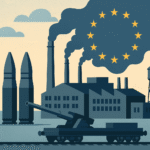The war in Ukraine has brought devastation on a massive scale, but discussions on reconstruction are beginning to gather momentum — opening potential opportunities for European businesses.
The Scale of Reconstruction
More than three years after Russia’s full-scale invasion, Ukraine faces a reconstruction bill estimated at $524bn over the next decade, according to the Ukrainian government and international institutions. The funding is expected to come from multiple sources: the Ukrainian state, international donors such as the European Union and the World Bank, and private sector investment.
The private sector alone could contribute as much as $170bn — roughly one-third of the total — based on the Rapid Damage and Needs Assessment carried out jointly by Kyiv and international partners. Already, over 100 companies have signaled interest, identifying opportunities in rebuilding Ukraine’s energy networks, transportation systems, and housing.
Opportunities in Infrastructure and Renewables
Reconstruction goes beyond replacing what was lost. Ukraine and its partners are emphasizing “building back better,” with a focus on greener, more modern infrastructure. This includes renewable energy projects such as wind farms and the development of modern residential buildings to replace those destroyed in the conflict.
European companies are especially well-positioned. Their geographic proximity reduces costs for transporting heavy materials such as cement and steel, while their compliance with EU safety and environmental standards makes them natural partners in reconstruction.
Examples include ArcelorMittal, which operates a subsidiary in Ukraine and is scaling up steel production; Ireland’s Kingspan Group, investing €280mn in a new manufacturing campus; and German and Austrian steelmakers Thyssenkrupp and Voestalpine, which could also benefit. In renewables, Denmark’s Vestas Wind Systems is providing turbines for a Ukrainian wind park, while France’s Schneider Electric is exploring grid modernisation in partnership with local energy investor DTEK.
Risks and Challenges
Despite the opportunities, significant risks remain. Ukraine’s economy faces high inflation, elevated labour costs, and soaring insurance premiums — all intensified by the ongoing threat of renewed conflict. Rebuilding infrastructure in war-damaged areas will also be slow and expensive.
Looking Ahead
Even so, reconstruction funding is already being secured, and projects are moving forward. For investors, the focus is shifting from war to the long-term rebuilding of a European nation. While defence stocks surged during the war, the next wave of investment may well be shaped by companies that help Ukraine rebuild — greener, stronger, and more resilient than before.








